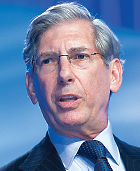IPS to Feature Patrick Kennedy, Celebrate Community Psychiatry

I am pleased to share highlights of APA’s 2013 Institute on Psychiatric Services with you in this Psychiatric News column as we get ready to meet in Philadelphia from October 10 to 13. The conference theme is “Transforming Psychiatric Practice, Reforming Health Care Delivery,” and I am very excited about this year’s meeting for many reasons. As APA president, I had the privilege of selecting the theme and have worked closely with the Scientific Program Committee in planning a learning experience that is innovative, diverse, comprehensive, and professionally fulfilling. In this column I want to share my thoughts on how this year’s theme is particularly relevant given the changes we are experiencing in the profession and some of the exciting program events that I hope will support APA’s goal of being in the forefront of changes in the profession under health care reform.
I am also very excited to announce two special events planned for this year’s attendees. Thanks to the support of the American Psychiatric Foundation, former Rep. Patrick Kennedy, a strong advocate for improved access to mental health services as part of health care reform, will join me for a session in the “Conversations” format, where we will discuss changes in psychiatric practice, stigma, and the need for increased advocacy to improve access to psychiatric treatment. I am also chairing a special symposium on the role of psychiatrists in the transformed health care system with esteemed colleagues Ellen Katz, Ann Sullivan, and Grant Mitchell.
These are among other offerings at this year’s IPS:
Over 120 workshops, lectures, symposia, innovative programs, and forums and a new course: “DSM-5: What Clinicians Need to Know and Practical Applications.” | |||||
An expanded track on integration of behavioral health and primary care that includes numerous interactive sessions in which psychiatrists, other mental health professionals, and primary care providers can learn and talk about our different clinical cultures and how to effectively collaborate and integrate to provide the highest-quality services to our mutual patients. | |||||
Several sessions on mental health recovery, including how psychiatrists can be involved. The Opening Session keynote will be presented by Estelle Richman, a pioneer in the integration of funding for behavioral health systems and a recipient of a Kennedy School of Government Innovation Award for the transformation of the Philadelphia behavioral health system. | |||||
A special session commemorating a half century of community mental health, featuring community psychiatrists representing each decade since the signing of the Community Mental Health Centers Act of 1963. | |||||
A special track organized by OMNA on Tour (APA’s Office of Minority/National Affairs) on the impact of psychological trauma on minority and underserved communities and families. | |||||
I congratulate the IPS Scientific Program Committee for developing a diverse program agenda to address the many issues facing the membership related to health care reform, including scope of practice, integrated service models, new payment mechanisms, and the changing role of psychiatrists and psychiatric practice under health care reform. Also, I want to offer a special thanks to the American Association of Community Psychiatrists for its continued support of this meeting—it remains the “must-attend” professional meeting for community and public mental health psychiatrists and other mental health professionals. See you in Philadelphia! ■



